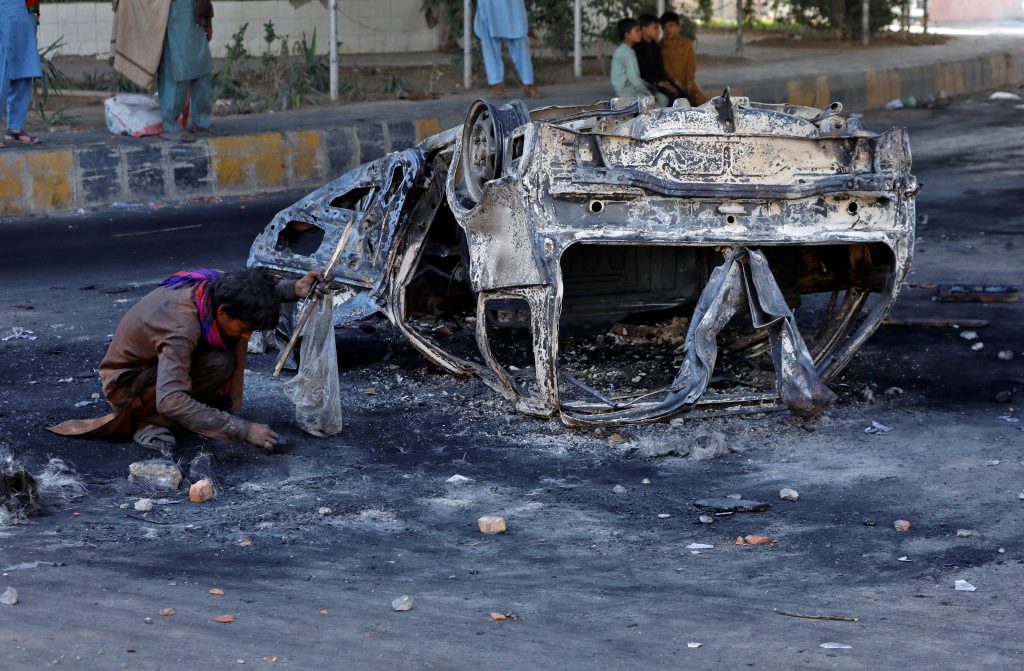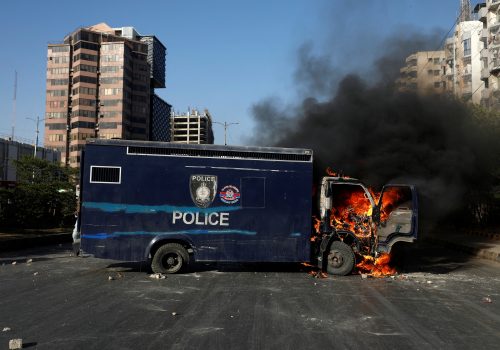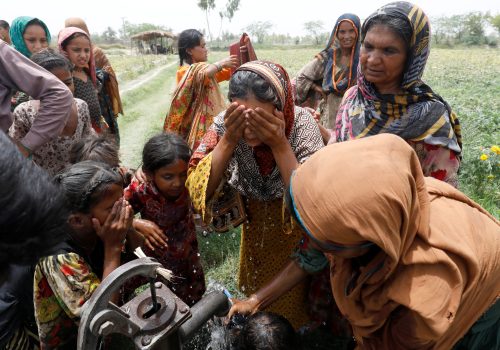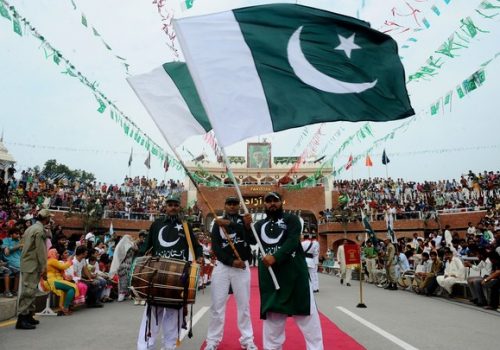Imran Khan, Pakistan’s populist former prime minister, is facing the biggest test of his political career as he challenges the very same security establishment that accelerated his journey to power in the 2018 elections.
Earlier this month, Khan was arrested by Pakistan’s paramilitary Rangers during a hearing for a corruption case at the Islamabad High Court. This came after the country’s anti-corruption watchdog issued warrants for his arrest related to the case. Moments later, Khan’s supporters took to the streets in protest, setting ablaze public and private property. Amidst their anger, the violent protesters did something that no political party has done in decades: they set ablaze the official residence of a three-star general in the eastern city of Lahore, with some going so far as to enter military headquarters in Rawalpindi to vent their frustration.
Imran Khan and his political party (the Pakistan Tehreek-i-Insaf, or PTI) have denied that their supporters were behind the violent protests, instead alleging that it was a conspiracy to squash the party and its followers. The former prime minister—now out on bail by the country’s Supreme Court—claims that General Asim Munir, Pakistan’s army chief, is leading a crackdown against Khan and his party.
However, the attacks on military installations brought a perhaps unintended but serious consequence—they gave Khan’s opponents a golden opportunity to dismantle the PTI. The military suggested that those who staged violent protests be tried under the Pakistan Army Act and the Official Secrets Act, a suggestion that has been approved by current Prime Minister Shehbaz Sharif’s civilian government.
Thousands of Khan’s party workers have been arrested across Pakistan and over a dozen leaders and former lawmakers have left the party. Those who still remain loyal to the former prime minister are either in jail or on the run. The political turmoil that Pakistan has been going through since last year could further dent the country’s turbulent democracy, and Khan’s opponents are not the only ones behind it.
Imran Khan, unlike other politicians, does not believe in talks with his rivals to settle political disputes. Instead, he stages rallies and calls opponents “thieves” and “looters” in front of thousands of supporters. His arrogance and refusal to engage in political dialogue with rivals has brought Pakistan’s political scene to a point of no return.
As a result, the situation is unlikely to improve anytime soon.
Khan’s main rivals—the parties of former Prime Minister Nawaz Sharif and former President Asif Ali Zardari—have been long active in the country’s politics. They, too, have experienced the wrath of the military establishment currently faced by the Pakistan Tehreek-i-Insaf. Their governments were either thrown out of power or weakened because of the establishment’s meddling. In the end, though, their parties still exist and remain key civilian players in Pakistan’s politics. Likewise, attempting to dismantle Khan’s political party will not simply make his support base and influence disappear.
Democracy is about not the politicians, but the voters who send these men and women into the corridors of power. There is no denying that Imran Khan and the PTI have a support base in almost every city of the country. If his party is dismantled, his supporters may lose interest in politics and serve to strengthen undemocratic forces in Pakistan, a trend which has long plagued its political landscape.
Imran Khan, with all his faults, is a popular leader and should face the law as would any other politician. That said, attempts to break his party should not only be opposed by all the political parties, but especially by those who are in the current government. If Khan and his military backers’ undemocratic sidelining of former Prime Minister Nawaz Sharif and former President Shehbaz Sharif’s party before the 2018 elections was indeed wrong, then the same rule must apply to the equally undemocratic crackdown against the PTI.
Democracy remains the only system that can save Pakistan from plunging into darkness. To strengthen it, all political parties need to come together and agree to the earliest date possible to hold countrywide elections in hopes of alleviating the political crisis. This fight is about power. Power comes from the people, and elections remain the only way to have their voice heard in government.
Roohan Ahmed is an independent journalist based in Islamabad covering politics and extremist groups in the region.

The South Asia Center is the hub for the Atlantic Council’s analysis of the political, social, geographical, and cultural diversity of the region. At the intersection of South Asia and its geopolitics, SAC cultivates dialogue to shape policy and forge ties between the region and the global community.
Related content
Image: A ragpicker collects usable items next to the debris of a burnt vehicle following a protest by the supporters of Pakistan's former Prime Minister Imran Khan against his arrest, in Peshawar, Pakistan, May 11, 2023. REUTERS/Fayaz Aziz



